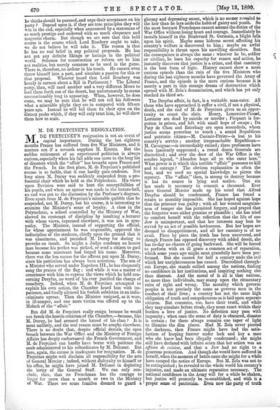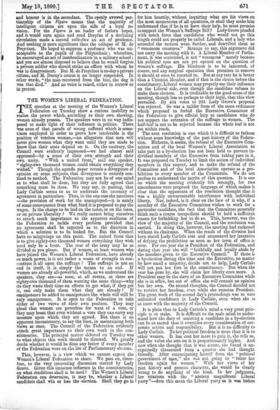M. DE FREYCINET'S RESIGNATION.
DE FREYCINET'S resignation is not an event of _in... capital importance. During the last eighteen months France has suffered from five War Ministers, and it matters not if a seventh supplant M. Krantz. But the sudden retirement of an experienced politician is always curious, especially when his fall adds one more to the long list of disasters which the "affair" has brought upon France and the French. In the first place, M. de Freycinet's published excuse is so feeble, that it can hardly gain credence. Not long since M. Duruy was suddenly suspended from a pro- fessorial chair which he held at the Polytechnic. His views upon Revision were said to hurt the susceptibilities of his pupils, and when an uproar was made in the lecture-hall, an end was put to the discussion by the Professor's disgrace. Even apart from M. de Freycinet's miserable quibble that he i suspended, not M. Durny, but his course, it is interesting to examine the Minister's sense of loyalty. A class in the Polytechnic, a school controlled by the Ministry of War, showed its contempt of discipline by insulting a lecturer with whose views, expressed elsewhere, it was not in sym- pathy. The Minister, instead of supporting the official, for whose appointment he was responsible, approved the indiscipline of the students, chiefly upon the ground that it was unanimous, and punished M. Durny for daring to provoke an insult. So might a Judge condemn an honest man because his pocket was picked, or send a citizen to gaol because some miscreant had forged his name. Moreover, there was the less excuse for the affront put upon M. Duruy, since his patriotism has always been notorious. The son of a Minister who served under Napoleon III., he has eloquently sung the praises of the flag ; and while it was a matter of conscience with him to express the views which he held con- cerning Dreyfus, no word of his ever justified the charge of treachery. Indeed, when M. de Freycinet attempted to explain his own action, the Chamber heard him with im- patience, and finally silenced his foolish subtleties in an indis- criminate uproar. Then the Minister resigned, as it were, in ill-temper, and one more victim was offered up to the Moloch of the "affair."
But did M. de Freycinet really resign because he would not brook the hostile criticism of the Chamber,—because, like M. Duruy, he had aroused the hatred of his class ? It is most unlikely, and the real reason must be sought elsewhere. There is no doubt that, despite official denials, the open breach between the War Office and the Ministry of Foreign Affairs has deeply embarrassed the French Government, and M. de Freycinet can hardly have borne with patience the snub administered to his subordinates by M. Delcasse. But here, again, the excuse is inadequate for resignation. M. de Freycinet 'o-ht well disclaim all responsibility for the acts of General ercier ; indeed, without disloyalty to himself or his office, he might have joined M. Delcasse in deploring the levity of the General Staff. We can only con- clude, then, that no Frenchman has the courage to linger for more than a month or two in the Ministry of linger There are some families doomed to guard a gloomy and depressing secret, which is no sooner revealed to the heir than he lays aside the habit of gaiety and youth. So the most buoyant Frenchman cannot assume the duties of the War Office without losing heart and courage. Immediately he installs himself in the Boulevard St. Germain, a blight falls upon his spirit. Maybe some hideous secret affecting his country's welfare is discovered to him ; maybe an awful responsibility is thrust upon his unwilling shoulders. But the consequence is always the same : whoever he be, soldier or civilian, he loses his capacity for reason and action, he instantly discovers that justice is a crime, and that casuistry is the best form of logic. History cannot show a more curious episode than the ruin of the five Ministers who during the last eighteen months have governed the Army of France, and the episode is the more curious because it is merely a part in this strange drama of destruction which opened with M. Zola's denunciation, and which has yet only reached its third act.
The Dreyfus affair, in fact, is a veritable man-eater. All those who have approached it suffer a civil, if not a physical, death, and the end of M. de Freycinet gives us an oppor- tunity to count the slain. Henry, Lemercier-Picsad, Lorimier are dead by suicide or murder ; Picquart, is for- gotten in prison, and left with small hope of escape ; Du Paty de Clam and Esterhazy are open scoundrels, whom justice seems powerless to touch - a sound Republican and patriotic citizen—M. Casimir:Perier—is lost to his country's service ; another irreproachable Republican— M. Cavaignac—is irremediably rained; three professors have been insolently suppressed ; a round dozen Generals are discredited ; and over the door of the War Office is the sombre legend, " Abandon hope all ye who enter here." What power is it which this terrible "affair" possesses to kill and to outrage ? The obvious explanation is often the best, and we need no special knowledge to pierce the mystery. The " affair," then, is strong to destroy because it has its source in lying and malice. One sin has made it necessary to commit a thousand. Ever since General Mercier made up his mind that Alfred Dreyfus should be condemned, France has found a return to morality impossible. She has hoped against hope that the prisoner was guilty ; with all her wonted sanguine- ness of temper she has permitted forgery, and prayed that the forgeries were either genuine or plausible ; she has tried to comfort herself with the reflection that the life of one Jew is unimportant, and that her interests may best be served by an act of possible lawlessness. But her hopes are doomed to disappointment, and all her casuistry is of no avail. Piece by piece the truth has been uncovered, and though France has opposed discovery with added deceit, she has to-day no chance of going backward. She will be forced to perform with an ill grace a common act of reparation, which some years ago might most gracefully have been per- formed. But she cannot for half a century undo the evil which her unrighteousness has caused. Discredited through- out Europe, she stands sullied among the nations, finding no confidence in her institutions, and inspiring nothing else than distrust. And the moral of it all is that nations, no more than individuals, may stamp upon the elementary rules of right and wrong. The morality which governs peoples is not precisely the same as governs men in the conduct of their lives ; a country has not the same high obligation of truth and outspokenness as is laid upon separate citizens. But countries, too, have their truth, and while they may simulate before rivals, they must exact within their borders a love of justice. No defection may pass with impunity ; when once the sense of duty is obscured, disaster is certain ; for there always remains one taper of light to illumine the dim places. Had M. Zola never pierced the darkness, then France might have had the satis- faction of keeping- forever under lock and key a man who she knew had been illegally condemned ; she might still have declared with infinite scorn that her action was an affairs de cuisine, and that a Jew had no right to a generous protection. And though she would have suffered in herself, when the moment of battle came she might for a while have escaped the notice of Europe. But M. Zola was not to be extinguished ; he revealed to the whole world his country's injustice, and made an ultimate reparation necessary. The national confidence in the Army will for a while be shaken, but justice will presently be re-established, and with it a proper sense of patriotism. Even now the party of truth and honour is in the ascendant. The openly avowed par- tisanship of the Figaro means that the majority of intelligent citizens are upon the side of a loyal re- vision. For the Figaro is no leader of forlorn hopes, and it would turn again and rend Dreyfus if a declining circulation made a second volte-face an act of prudence. And nothing is more significant than the collapse of M. de Freycinet. He hoped to suppress a professor who was un- acceptable to the pupils of the Polytechnic ; wherefore, he encouraged an act of insubordination in a military school ; and you are almost disposed to believe that he would forgive a private soldier who should strike an officer with whom he was in disagreement. But M. de Freycinet is to-day a private citizen, and M. Duruy's course is no longer suspended. In other words, " the man recovered from the bite, the dog it was that died." And no voice is raised, either in sorrow or in protest.







































 Previous page
Previous page